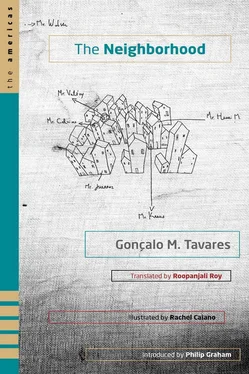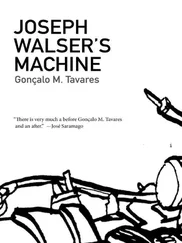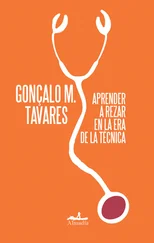Yes, a fine answer, thought Calvino: kill it immediately! But if all the world’s problems were merely conjugal ones everything would be a lot easier. In fact, the main problem was something quite different.
Above all, it was a question of quantifying the uncontrollable. This was the big question. To quantify what could not be described.
“I do not know how to give names to what I see, but I can do some calculations.” This was what Calvino sometimes thought.
Or better still, “I do not know how to give names to the things I see, but I can count them.”
Counting, instead of understanding or explaining.
For example, if at that precise moment Calvino was surrounded by various unknown things whose functions and reasons for existing he was unaware of, he could always calm himself down by counting them: one, two, three, four, five, six, seven, eight: eight things that I do not know!
And this reassuringly familiar number, eight, would calm him down. One, two, three … eight monsters. “In such situations, at least we have the counting under control,” thought Calvino.
But suddenly, without having been summoned, the world appeared right before him once again. Calvino almost fell over.
On the sidewalk, an iron manhole cover that was not in its usual place had narrowly missed causing him to fall. Calvino stopped and looked inside the hole: various kinds of pipes, in circular or other kinds of trajectories, as though someone had built a sports facility for the water to have fun before it gushed out of taps and became merely useful.
He immediately remembered the relationship that a certain man had with holes.
This man had first looked up and had then looked sideways in both directions, confirming that there was no danger.
Then, completely safe, he let himself fall.
Well, but it wasn’t the right moment to let himself fall.
Calvino then did something that we can describe as seven initiatives to close one single thing.
However, the manhole cover would not fit into the hole that had been made for it. He then amiably handed over the heavy iron cover to a policeman, placing it in his hands, but not without first briefly exchanging a few words with him:
“This is yours.”
“No, it’s yours.”
“Mine? No. It’s yours.”
The discussion with the policeman had, however, left him with a mild albeit persistent pain in his thumb. It had been a mistake to engage in an intellectual discussion with a manhole cover in one’s hands — he would never repeat such an error.
In fact, it was almost as though his thumb had been stricken intellectually. He now moved it forward and backward, then to the right and then to the left, to check if, essentially, some malfunction or rupture had taken place.
It had been man’s ability to manipulate his thumb that had enabled human beings to conquer the world — Mister Calvino was well aware of this — but the thumb that could be used against evil also served for detailed amorous trajectories. And this mixture, this confusion between good and evil, pleasure and pain, was far from being the only one in the world.

“How do you do, ma’am?”
Mister Calvino was always very courteous. However, that meeting could not help but remind him of a slightly unpleasant story. That of an uncommonly ugly woman who was prevented (at the frontier) from proceeding, since they accused her — and the crime was plain to see — of wanting to traffic in frights.
And since they no longer wanted her in her homeland, the woman in question stayed forever in a no-man’s-land, between two nations, a neutral site that tolerated emptiness, tedium, fealty, and other assorted horrors of our civilization more easily.
“Is everything all right, ma’am?”
Calvino had been blessed by an uncommon courteousness. On social occasions, even in strange houses, he would rush to be the first to sit on various chairs. He went successively from one chair to another, while the other guests were still standing — and thus seemed quite ill-mannered. However, what Calvino was doing was trying them — the chairs — so as to later be able to offer the most illustrious individual present the most comfortable and suitable one of all, with the wisdom gleaned from his firsthand experience. Mister Calvino did not try wines, he tried chairs.

Calvino then cordially bid the lady farewell and a few meters later took a small piece of paper out of his pocket and wrote the following words:
Provincial
— in space
— in time.
An individual who was provincial in terms of space, he ruminated, was someone who was influenced by and tried to influence the forty square meters around himself. An individual who was provincial in terms of time was someone who was influenced by the preceding afternoon and sought to influence, at the very least, the next two days.
In this regard, he recalled that figure described by the writer T., a person who was so cross-eyed that on Wednesdays he was able to simultaneously see two Sundays.
And Calvino thought: yes, that is definitely a lucid gaze.

Well now, having already reached the end of the afternoon, and well inside a narrow street, Calvino first looked to one side and then the other. They were definitely two parallel straight lines, and he, by mere chance and sheer luck, was right in the middle of them.

He continued to proceed.
Two perfectly parallel straight lines, and he was right in the middle. What luck. Two parallel straight lines!

But gradually something began to change …

and continued to change …

Mister Calvino then stopped (also because he could not proceed any farther).
He had found what so many others had sought: the infinite. He wrote down the address in his notebook.
It was located at the end of Rue de Le grand.
Tedium

Since reality was extremely tedious for Mister Juarroz he stopped thinking only when it was absolutely unavoidable. Situations in which he was obliged to stop thinking included:
— when people spoke to him very loudly
— when people insulted him
— when people pushed him
— when he had to use any useful object around him.
Sometimes, even in these aforementioned situations, Mister Juarroz did not cease to think and therefore other people assumed that:
— he was deaf (because he didn’t listen when people spoke to him very loudly)
— he was a coward (because people would insult him and he wouldn’t react)
Читать дальше




















